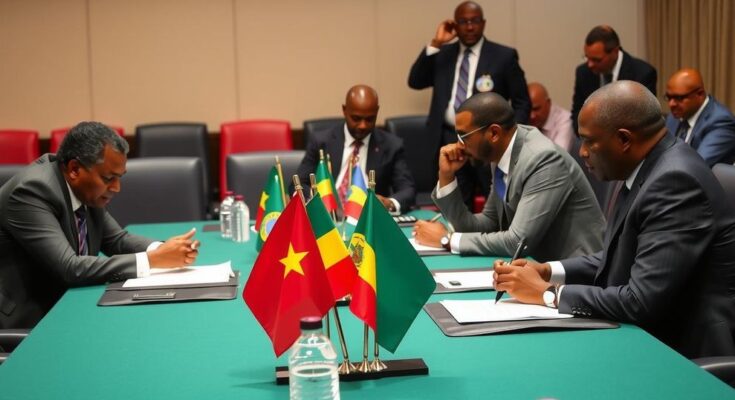The African Union has urged Ethiopia and Somalia to promptly implement their new agreement aimed at resolving disputes over Ethiopia’s access to the sea, which has been a point of contention since Ethiopia’s deal with Somaliland. The AU labeled this step as essential for regional stability, while expressing concerns that unresolved issues related to Somaliland could complicate future relations.
The African Union (AU) recently called upon Ethiopia and Somalia to hasten the implementation of their newly forged agreement meant to resolve longstanding tensions regarding Ethiopia’s maritime access. The AU characterized this accord as a significant act towards fostering stability in the region. Tensions flared when Ethiopia entered a deal with Somaliland to establish a port and military facility, a move that Somalia argued infringed upon its sovereignty. With international concerns surrounding potential conflict, swift action is paramount to uphold peace.
Following mediated discussions facilitated by Turkey, a concise framework was established emphasizing mutual cooperation, yet specifics remain obscure. According to Turkish President Recep Tayyip Erdogan, this deal intends to secure Ethiopia’s long-sought coastal access. The AU stressed the momentum already built by Ethiopian Prime Minister Abiy Ahmed and Somali President Hassan Sheikh Mohamud, illustrating a positive step towards resolution. Subsequent dialogues are projected to commence shortly with an emphasis on enhancing commercial ties, all while respecting Somalia’s sovereign authority.
Nonetheless, the potential implications for the earlier understanding between Ethiopia and Somaliland are still unclear, leading to a cautious and complex diplomatic landscape. Currently, relations between Somalia and Ethiopia have soured, especially after Somalia’s expulsion of its Ethiopian ambassador and the exclusion of Ethiopian troops from upcoming AU peacekeeping missions.
The geographical and political context between Ethiopia and Somalia has been historically tumultuous, largely stemming from Ethiopia’s landlocked status after Eritrea’s independence in 1993. The recent agreement between Ethiopia and Somalia speaks to Ethiopia’s urgent desire for direct access to maritime resources, which has been complicated by its dealings with Somaliland, a region that declared independence from Somalia in 1991 but is not internationally recognized. Somalia perceives these agreements as threats to its territorial integrity, heightening fears of conflict in an already volatile region. The AU’s involvement underscores the regional effort to mediate and find peace amidst the tensions.
In conclusion, the agreement between Ethiopia and Somalia represents a critical juncture for both nations, highlighting the need for rapid implementation to avert potential conflict. The African Union’s emphasis on cooperation and the establishment of technical dialogues suggests a pathway toward enhanced relations and stability in the Horn of Africa. However, clarity regarding the implications of Ethiopia’s prior agreements with Somaliland remains a crucial factor to monitor moving forward. The ongoing dialogues symbolize a cautious optimism for sustained peace in the region.
Original Source: english.alaraby.co.uk




